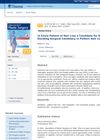Evaluation of Body Dysmorphic Disorder in Hair Loss Patients and Benefit After Hair Restoration
July 2012
in “
Hair transplant forum international
”

TLDR Hair transplant improved self-perception in hair loss patients, but some still remained overly focused on their hair appearance.
In 2012, a study of 100 patients seeking hair transplants found that 27% showed signs of Body Dysmorphic Disorder (BDD), a condition characterized by obsessive focus on perceived appearance flaws. This rate was higher than typically seen in cosmetic surgery patients. The severity of hair loss did not correlate with BDD prevalence. Post-transplant, patients generally perceived their appearance more positively, with 12-32% shifting to a mild perception and 11-22% to a moderate perception of their deformity. However, 16% still scored as extreme on the Derriford Appearance Scale, indicating continued preoccupation with their hair. The study concluded that while hair restoration improved appearance, lifestyle, and self-perception in hair loss patients, further research was needed regarding its impact on BDD.




